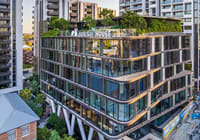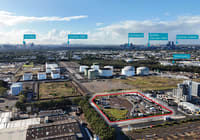
Gresham raises $750m for debt fund as banks, non-banks retreat
Sydney finance house Gresham Property has raised more than $750 million from institutional investors for its latest debt fund, as it looks to build its market share amid a credit squeeze.
Gresham’s latest fund, GPF7, will provide bespoke loans of between $30 million and $150 million to developers holding unsold apartments at the end of projects and to commercial property owners seeking financing for assets with higher leasing risk or that are in the process of being repositioned or refurbished.
“Liquidity has dried up significantly,” Gresham Property joint managing director Ami Simon told The Australian Financial Review.
“Banks are focused on servicing their existing client base while there has been a considerable pullback from the high net worth investors who fund many non-banks,” he said.
In Melbourne, non-bank lender Qualitas stopped all new lending while another prominent Collins Street-based real estate financier Wingate has reined in new lending and said it was being “a lot more cautious”.
But for Gresham Property, a subsidiary of investment and advisory firm Gresham Partners, the tightening credit environment and tough leasing market has provided further opportunities to raise and deploy funds.
Its new fund has already deployed its first investment, a $95 million residual stock loan, and it is cautiously seeking out other opportunities to deploy funds amid the “fast changing environment”.
Joint Gresham Property managing director Mike Burley said he expected further demand for such bespoke funding, given that a lot of sales to offshore purchasers had not settled.
The new fund will also provide finance for commercial properties whose higher risk profiles have made it harder for owners to secure bank funding.
These include properties with short weighted average lease expiries (WALES), those with vacancies or properties undertaking repositioning or value-enhancing works.
The fund is targeting investments in the $30 million to $150 million range, but will consider larger loans for “compelling opportunities”.
“We offer terms more flexible than the banks,” Mr Simon said. “Our interest rates are higher but we lend more.”
He said loan terms of up to five years were possible, with loan-to-value ratios and interest rates determined on a case-by-case basis.
Gresham Property’s sixth fund, which raised $500 million, is still deploying funds for construction financing and redevelopment financing of residential, commercial and mixed-use developments.
Its first four funds were mezzanine and preferred equity funds. But since then it has provided “stretched” senior debt finance, allowing it to fund an entire development project or investment.
Looking ahead, Mr Burley said it was likely that there would be a depression in values and rental income in the short to medium term, with retail property to be “challenged for quite a while”. On the other hand, logistics and warehousing remained very strong.
As for office property, he said the outlook would depend on factors such as whether there was a permanent change in behaviour following the pandemic, such as more people choosing to work from home.











